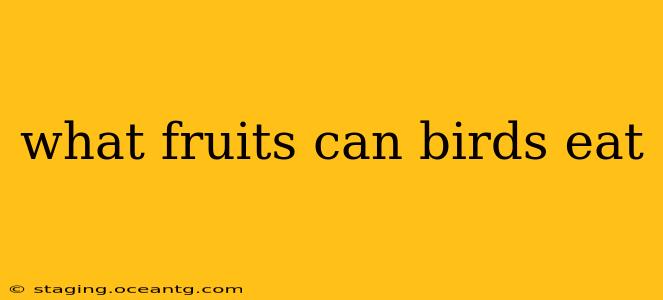Feeding birds is a rewarding experience, connecting us with nature and providing essential nourishment for these feathered friends. Many fruits are safe and even beneficial for birds, offering vital vitamins and minerals. However, it's crucial to understand which fruits are suitable and how to offer them safely. This comprehensive guide will explore the various fruits birds can eat, addressing common concerns and providing valuable tips for responsible bird feeding.
What Types of Fruits Are Safe for Birds?
A wide variety of fruits are safe and nutritious for birds. The best choices are generally those that are soft, easily digestible, and naturally occurring in their environment. Here are some popular options:
-
Berries: These tiny powerhouses are a favorite among many bird species. Blueberries, raspberries, strawberries, cranberries, and blackberries are all excellent choices, providing antioxidants and essential nutrients. Remember to remove stems and leaves before offering them to birds.
-
Melons: Watermelon, cantaloupe, and honeydew melon are hydrating and sweet treats that birds enjoy. Cut them into small, bite-sized pieces to prevent choking hazards.
-
Apples: Apples are a great source of fiber and vitamins. Remove the core and seeds before offering them to birds, as the seeds contain small amounts of cyanide. Offer slices or small chunks.
-
Bananas: These potassium-rich fruits are a delicious addition to a bird's diet. Offer them in small pieces.
-
Oranges: While birds enjoy the sweet segments of oranges, ensure you remove the peel and any membranes which can be difficult for them to digest.
What Fruits Should You Avoid Giving to Birds?
While many fruits are beneficial, some should be avoided due to their potential toxicity or difficulty in digestion.
-
Avocado: Avocados contain persin, a toxin that can be harmful to birds.
-
Citrus Fruits (in large quantities): While small amounts of oranges are fine, large quantities of citrus fruits can cause digestive upset due to their high acidity.
-
Grapes and Raisins: These can be toxic to some birds and should be completely avoided.
-
Stone Fruits (with pits): Fruits like cherries, peaches, and plums contain pits that can pose a choking hazard. Remove pits before offering these fruits to birds.
How to Safely Feed Birds Fruit
-
Freshness is Key: Always offer fresh, ripe fruits. Avoid moldy or spoiled fruits, as these can cause illness.
-
Small Pieces: Cut fruits into small, manageable pieces to prevent choking.
-
Variety is Important: Offer a variety of fruits to provide a balanced diet.
-
Moderation is Crucial: Fruits should only supplement a bird's diet, not replace their primary food sources like seeds, nuts, and insects. Too much fruit can lead to digestive issues.
-
Cleanliness: Keep bird feeders and areas where you place fruit clean to prevent the growth of bacteria and mold.
-
Observe Your Birds: Pay attention to how your birds react to different fruits. If you notice any signs of illness (lethargy, diarrhea, etc.), discontinue feeding that fruit.
Can Birds Eat Fruit Peel?
Generally, it's best to avoid feeding birds fruit peels. The peels can be difficult to digest and may contain pesticides or other harmful substances. Stick to the flesh of the fruit for optimal safety and nutrition.
What Fruits Do Different Types of Birds Prefer?
Different bird species have different dietary preferences. Some may prefer berries, while others may favor softer fruits like melon or banana. Observe your local bird species to determine their preferences. For instance, smaller birds might prefer smaller, softer fruits like berries, while larger birds might handle larger pieces of fruit like apple slices.
Are there any other things I should know about feeding birds fruit?
Yes! Always prioritize natural, unprocessed fruits. Avoid fruits that have been treated with chemicals or preservatives. Remember that fruit is a supplemental treat, not a staple food. A balanced and varied diet is essential for the health and well-being of your feathered friends. By following these simple guidelines, you can provide your birds with a delicious and nutritious treat while ensuring their safety and well-being.
